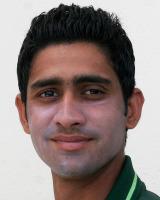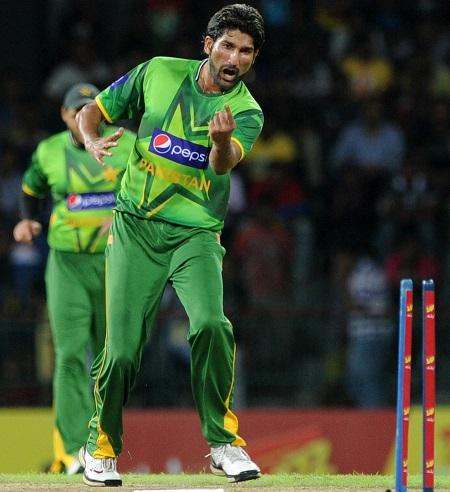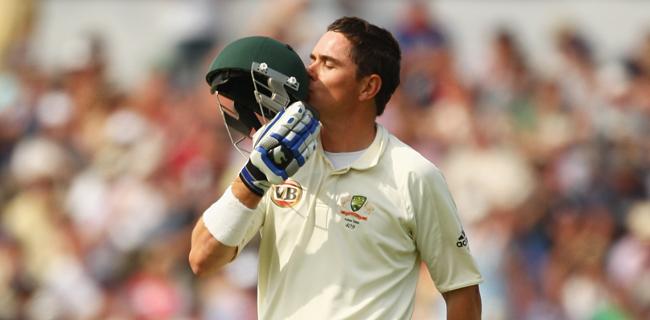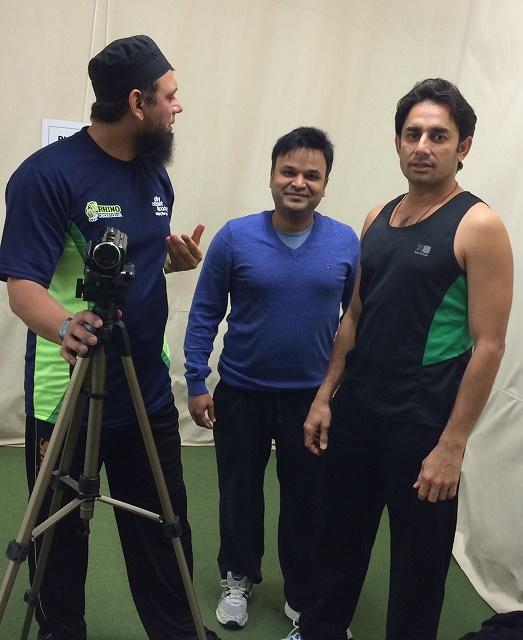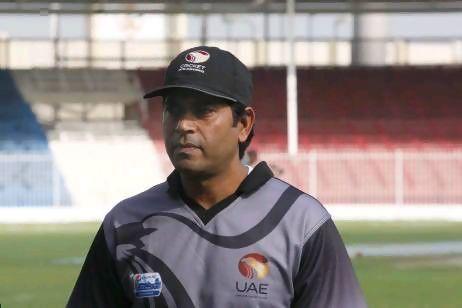Pakistani broadcasting legend Chishty Mujahid speaks to PakPassion about his interests, commentary and the Pakistan Super League (PSL) and Pakistan?s ongoing tour of India.
Chishty Mujahid is widely regarded as the grand old voice of Pakistani cricket, a legendary figure in Pakistani Cricket journalism and broadcasting whose name has become synonymous with Pakistani cricket?s best known triumphs.
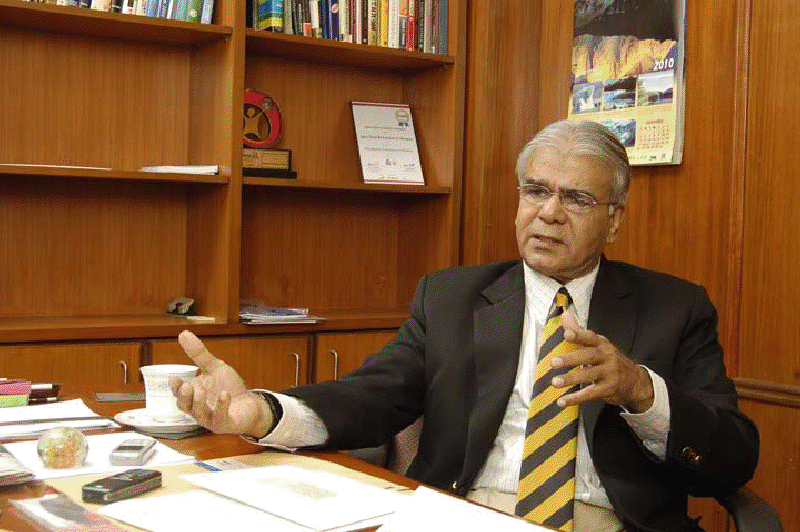
He was born in 1944 in New Delhi and after reading Law at the prestigious Selwyn College, Cambridge, Chishty at the age of 23, decided to take up Radio commentary on part time basis.
Chishty moved to TV commentaries on Pakistan Television (PTV) in 1970 and has continued to commentate in Pakistan and around the world. He has also commentated for and appeared on Doordarshan, Rupavahini, Worldtel, Sony, South African Broadcasting Corporation, BBC (Urdu) Hum FM (U.A.E.). He writes on cricket for all major newspapers in Pakistan as well as Cricketer magazine in Pakistan.
He has been nominated for the Best Sports Commentator?s Award for PTV three years in a row ? 1985, 1986 and 1987 winning the award in 1986 and has won the PBC (Radio Pakistan) Best Cricket Commentator Award in 1999 and Excellence Award 2001. He was awarded President of Pakistan?s Medal for Pride of Performance 2003 which is a rare honour for TV commentators - Only 3 out of 43 have ever been awarded this prestigious award.
In an exclusive interview with PakPassion.net, Chishty speaks about his interests and current standards of commentary, his views on the upcoming Pakistan Super League (PSL) and Pakistan?s ongoing tour of India.
PakPassion: Let's start off with a question on how you initially became interested in TV commentary and a little bit about your background - in particular, your educational background and what interested you in starting with commentary and such?
Chishty Mujahid: That?s a long story. 68 years of background is what you want, and if you have the patience you can have it! Right from the beginning, ever since I could walk or even talk I was interested in cricket for some reason or other. When I was a toddler I used to play and continued as I grew up.
I was born in New Delhi in 1944 and then migrated to Pakistan with my parents. I was educated at Karachi Grammar School and played for the school, which was when the interest arose. Earlier on I used to play in the streets with the friends in the neighbourhood and my father always promised if I came first in class he would buy me a cricket set. That was incentive for me to work hard and my father was true to his word so he did that. Since I owned the cricket kit, I was the captain as that was the norm those days!
I played for Karachi Grammar School and went to Selwyn College, Cambridge University and played for my college there. I was reading law and there was a lot of cricket in England of course so I played for them, but I am one of those who realises and recognises his limitations - I am not somebody who thinks I can do everything. So I realised very quickly that if I play cricket I will not get the degree and if I go for the degree I probably wasn?t good enough to play cricket. If you want to do anything, you do it to reach the top level. If you are in an executive position you must theoretically be able to go right up to the chairmen level. In cricket I realised ?no, this wasn?t where I could probably play for Pakistan and I would not play Test Cricket? and as such I concentrated on studies, got my degree, and came back to Pakistan.
In England I had heard a lot of commentary obviously John Arlott, Brian Johnston, Peter West and few others. Once I came back to Pakistan, I applied for Radio Pakistan - there was no television in those days - and they invited me for an audition. I went for an audition, I suppose my voice was tolerable, my knowledge of cricket passable, and so there it was.
I made my [commentary] debut in 1967, at the ripe old age of under 23. That was in the match with MCC Under-25 led by Mike Brearley who was three years my senior at Cambridge although our paths didn?t cross at that time. He led an Under-25 team to Pakistan when Pakistan?s Under-25 team, was led by Asif Iqbal. It all began in Hyderabad, Sindh where MCC Under-25 was playing South Zone led by Hanif Mohammad. That?s when I started my career as a radio commentator and then went on and did television from 1970 onwards. I continued with radio and television and its gone on up to now.
PakPassion: Being a Law graduate from Cambridge, I?m guessing cricket commentary wasn?t a fulltime career?
Chishty Mujahid: No, it was a very expensive hobby because we were not paid very much and we had full-time jobs, I used to work. I didn?t practice law which was rather difficult for my father to swallow. He wanted me to be a lawyer and so I worked for some multinational companies - I worked for Glaxo Laboratories, Unilever, Smithkline, Apple, Unisys etc at senior management level. In fact there wasn?t as much cricket as there is now because there was only one type of cricket. There wasn?t all this tamasha and slam-bang-bang, so cricket was probably once a year and it was once in two years that you got an opportunity. In that time all the leave that was due to an employee of a company was consumed in the pursuit of a hobby which was expensive but great fun. I think my family, particularly my wife and daughters, are to be credited for it because they supported me to the hilt.
PakPassion: After taking leave from work to do commentary stints and when you returned, were you a celebrity at work? How were you treated?
Chishty Mujahid: I think there was a dual reaction to that. Some people took it as an advantage, that you are a known figure, both face and voice, so it is easier at work because you could go into government office and would be very welcome, which was the case because if I was in public affairs and public relations and government relations that was the case, but at times you had a lot of jealousy from colleagues. That is a problem. You know in our country particularly, a lot of them would tell your boss that this person does not do any work, just goes around doing cricket commentary! Some of the bosses would probably listen to those and others would say no as they recognised your worth to the company.
PakPassion: Nowadays, with the advent of internet, there are so many resources to look up records but in your days, you were quite unique among your peers as your commentary incorporated a lot about past cricketing records and trivia. How did you remember it all? Did you have that record book with you or did you have a bunch of people helping you out who did that work for you?
Chishty Mujahid: No, you will be very surprised but there was none of this. I was a very avid reader of cricket, I had the Wisden for my reference, there used to be a ?Playfair Cricket Annual? and I read a lot of books on cricket. Cricket by the way is the game on which more has been written then all other games of the world combined - that?s a fact - so you have a lot of books you can read.
In fact there are books by Leveson Gower, Alan Gibson and those famous writers whose names escape me now, but some fine pieces of literature I used to read. I did have a very strong memory at that time and some of the facts I still remember, but no, I didn?t have any battery of people helping me. I didn?t even keep a book - in fact now my memory is faded completely and I can?t, I mean I still remember things apart from cricket like Shakespeare and Wordsworth, Byron, Shelley and Keats from the 1950-60 which I read at that time and of course Ghalib, Iqbal, Mir and all the others, and I can still sort of chatter them away but if you tell me to learn any poetry or learn anything else now I don?t think I will remember. I will forget it after two hours - that?s old age coming catching up I suppose!
PakPassion: For a lot of cricket fans who started watching in the 1970s when you were on TV, the abiding memory would be of listening to and watching you and your partnership with Iftikhar Ahmad. What was that partnership like and do you still keep in touch?
Chishty Mujahid: Yes, we are still in touch. We did our last commentary together I think earlier this year, or last year. We're still around - the Ifti-Chishty combination it?s still there, although there are others who have come in and we have of course faded out, and we would like to let the youngsters move in. Ifti lives in Canada, he is a Canadian national. I of course will not at any cost leave Karachi. Sometimes, we were together - in 2011 we did the match just before the World Cup, I think when Pakistan toured Australia or something like that.
In the days of old, you were handicapped by the fact that you had no choice but to listen and see us (for which we are sorry!), because we only had Radio Pakistan and Pakistan Television. Now of course there are so many FM stations and also the television channels have multiplied, there is cricket 24 hours on every channel you can think of all over the world, with all sort of matches being played.
So obviously if we are commentating, people think that we are not there because they are not seeing us. We don?t advertise ourselves - we are slightly modest in that way, but cricket commentary and cricket people think that it?s a passion or religion but I think it?s an addiction. The term addiction is a slight degree higher than these things and if you don?t get the substance to what you are addicted to then you are in great trouble!
So Ifti is still there, our friendship has grown and we get together now and then, sit quietly, have lunch or tea. We are still available to do commentaries as far as people might like to. You see there is a lot of jealousy coming here as well - if these two can do it why can't we? We said please carry on and do it and we wish them best of luck.
It also became a trend with the arrival of Kerry Packer. Now before you ask me that question I might answer it - when Kerry Packer arrived on the scene he was a business man remember that. Now Kerry packer was paying for, say, five teams and there were only two playing. He said why should the other three rest? So he put them on the commentary, he said ?you do this job? and that is when the ?cricketer-commentator? started off and some of them are good I must say and some of them are terrible. But I must also tell you that a commentator besides having a knowledge of cricket; you need not have played cricket at the highest level to be a commentator. So I could teach it, but you don?t have to be a brilliant student. If you are brilliant student you need not be a brilliant teacher and the other way around, you must have the basics.
As a commentator, you must have some knowledge of cricket, be a student of cricket and I think, have broadcasting sense. You know when to speak and when not to speak, how to modulate your voice, when to raise it and when not to raise it. Richie Benaud before he was given the microphone had couple of years of training with the ABC. Nowadays, you just throw them in and say ?ok, here is big name and he just retired from cricket put him on?, which is a good thing in way, I'm not saying it?s not. You see those days have gone when the pronunciation mattered or the accent mattered or the expression mattered, now you can say whatever you want.
PakPassion: Any funny incidents, any slip of the tongue, during your time that comes to your mind during your commentary spells?
Chishty Mujahid: No, I don?t have any of those funny clips like Brian Johnston, not really, I don?t think so, Probably there was only once when I was commentating, I won?t narrate the entire incident, the batsmen at the crease was Roy Virgin, maybe I said something which sounded very funny and my colleagues collapsed in the commentators' box and I didn?t know what was going on. If you're going to have an opening pair called Virgin and Kitchen you're in trouble ? Mervyn Kitchen and Roy Virgin.
PakPassion: What is your recollection of Mr. Umar Qureshi of PTV and Radio Pakistan?
Chishty Mujahid: Umar Qureshi? Oh yes radio and TV, He was our mentor. He was a very fine person. Basically his first love was journalism and he was a five-star journalist and then of course a five-star commentator. He was extremely kind to me and on several occasions recommended me as a commentator. One of the best things that I've heard anyone saying about me was when he was talking to somebody in authority ? he was saying ?you take Chishty Mujahid from this assignment, he is this and above all he knows his cricket?. Now if Umar Qureshi says of someone that he knows his cricket, then he must know his cricket. May God bless his soul, lovely man
PakPassion: Moving on to some of the matches that you had the chance to commentate on, you must have seen some of the most fantastic players. Which kind of match, or which particular match, sticks in your mind?
Chishty Mujahid: The two matches that really stick in my mind are the Test matches in 1979 - one in Lahore against India and the one in Karachi. Karachi one as you probably will recall, or look up in the record. You see that game turned into almost a one-day game in the end. Some brilliant captaincy by Mushtaq [Mohammad] and some brilliant running by Asif [Iqbal] and Javed Miandad and then in the end the mistake as they say made by Bedi by bringing in himself on. Someone like Imran [Khan] clobbered him for a couple of sixes for 19 in an over or something like that. Actually that was the peak.
People think that Javed Miandad six should be featuring in that. Yes I was there on the radio when Javed Miandad hit that sixer. That was very exciting. There was another six which was by Asif Mujtaba against Australia; he hit one to win the match. We always seem to remember things against India and try and forget the other ones and of course don?t forget Sarfraz Nawaz' 6 or 7 wickets for 1 run. The Australians didn't know what hit them. Sometimes you can go on and on, 45 years is long time! Remember I can?t boast of having covered every match in 45 years, but most of them which I have covered; some of them have been boring, drab, the others exciting. Test matches can be extremely exciting, I think more exciting than any T20 or ODI.
PakPassion: You just mentioned the Sarfraz bowling spell - Any other bowling spell that you remember ?
Chishty Mujahid: I think there are a number bowling spells that I remember. I remember as a child, my maternal side lived in Lucknow and my father was in Pakistan?s High Commissioner in India in 1952. I was a small child and father was posted in New Delhi and I watched that match which Pakistan lost by an innings, much to my depression. Then we went to my grandfather and grandmothers houses in Lucknow. There we saw the matches against India at the University Ground which was not very far from the house, it was across the house. By the way it was the only Test match that has been played in Lucknow. After that they shifted the venue to Kanpur which is 40 miles away from Lucknow. Fazal Mehmood rocked them out of reckoning, India was a depleted side, they were having some internal problems I think if I recall, and I read that book by Mr. Kardar, the team which played in Delhi and then one which played in Lucknow had about five or six changes in the Indian side, but then in Mumbai they came back strong.
The umpiring I am told, I couldn?t understand at that time, but umpiring was well let?s not talk about it. Fazal Mehmood of course was a legend, I did not see the 337 by Hanif [Mohammad] but I read about it, I didn?t even hear it. I have talked to Hanif quite a bit about it. You know the story of the man who was watching it from the tree? He was watching it sitting on a tree - in our countries and in the West Indies if you can?t get into the ground you just climb up to the tree. Watching Hanif, who batted all day, this man at the end of the day fell down and he was taken to the hospital. So he was patched up, kept there for a day and he came back and climbed up the tree again and he saw Hanif still batting three days later. He fell off again - he was so in shock that he fell off! Hanif batted 999 minutes, although some say it was 960 but what is a few minutes between friends?!
On the domestic scene I remember the other spell of Imran Khan against India in Karachi. This was in the 1980s, it was 83 or 84, where he was swinging them like a boomerang and I would not forget the wicket of my good friend Vishwanath, who left the ball outside the off stump which came back and knocked off the leg. He was in a shock, in stupor, when he came back. So these are the ones; well I have been all over the place - Zimbabwe, South Africa, Australia, New Zealand. Zimbabwe in the beginning didn?t know much about cricket. First time we landed in Zimbabwe they asked ?what are you doing here?? and we said ?Zimbabwe Cricket Union? to which they replied ?what cricket union?? Later on, I think Zimbabwe developed into a fine side and they could have developed more but unfortunately they had their problems. They had some very fine players - the Flower brothers, Alistair Campbell and Henry Olonga just to name a few.
PakPassion: Is it fair to state the standard of commentary has gone down considerably from your days?
Chishty Mujahid: It'll be unfair for me to comment on it. I think it has gone down all over the world, not only in Pakistan. If you hear the old records of the BBC, the ABC, and even the Indian broadcasters you'll see it's gone down. It's gone down for various reasons. There is no broadcast training. There is nothing of that sort. We were trained by people who were broadcasters. Now of course you just put anyone in. You see, what I feel is that on television in particular, we are speaking too much, including myself, as commentators. We're speaking all the time. In television it is an insult to the intellect of the viewer if you tell him that ?he picks the ball up and throws it in? or ?that one has gone into the covers?. Of course it?s gone into the covers. Or if you say ?he plays it on the front foot?. I don't know why they are doing it. At times it seems they are doing radio commentary on television and when you want to put them on the radio, they can't do it. It's a bit of a hotchpotch. But anyway, who cares these days? The only thing people - the audience and spectators - want these days is to know the score.
In radio they are not interested in the intricacies of the game. Radio is such a medium where it?s lovely describing it. Describing the weather, the crowd, the atmosphere, the ambiance, and what the player is wearing. Is he wearing a sleeveless sweater or a full sleeve sweater? What they do these days on the radio is to listen to it on the drive - from work, to work etc. They keep telling us ?you don't tell us the score quickly enough?. They just want the score. All that commentators do these days is after every two deliveries they'll tell the score. Then the driver either switches off the radio or doesn't listen further because he is concentrating on the traffic, which is horrendous in every part of the world.
People forget what audience you are targeting. In Pakistan, India and other places, leave England and Australia out of this, you are usually being watched by housewives and students because men are supposed to be at work and not switching on their televisions, although they do these days. Even in big offices where you see the Chairman and Managing Directors having a TV they switch the volume off. They're just watching the pictures. If the housewife wants to know what two slips and a gully is, you might as well identify it for her. You say that's the wicket-keeper and that's when the camera pans on the wicket-keeper and goes into the slips. These days it?s more a coaching class; ?He should bring this field in, he should bring that field in.? The common person is hardly interested in that nonsense. He just wants to know various other things. Anyway, I may be from the wrong school of thought. I have no problem with what is going on these days and somehow I enjoy myself.
PakPassion: Essentially the real concern by people is about the quality of information we get on TV via the commentators and the ?tamasha? atmosphere ...
Chishty Mujahid: That's the modern trend. One must move on with the times. Did you ever think there would be half-dressed cheerleaders on a cricket field? That's part of it now. You have all the film actors and actresses. I think the entire thing has changed and people should move on with the times. The oldies must also get themselves adjusted to the modern times. I think so because there is a lot of influence in cricket, because a lot of money has come in. It's megabucks now in cricket as well. A lot of cricket coverage is influenced by the coverage of soccer. Soccer of course is another ball game. That is what is happening. The channels want a lot of hullabaloo. As such, I don't have anything against it, but yes if you are a classicist, if you're a traditionalist, then you would like cricket for the sake of cricket. That can be found in Test matches these days. If you see the Ashes Test matches, South Africa versus. Australia, and maybe, who knows, sometimes if it happens, India versus Pakistan.
PakPassion: The Pakistan Super League is going to be a major event in Pakistani cricket. In terms of the media aspect of this tournament (i.e. broadcast quality) what kind of technical changes would you like to see as a professional?
Chishty Mujahid: Pakistan Television (PTV) has some very experienced cameramen, engineers, and producers. What they need to do is upgrade their equipment. The equipment is still what used to be in my days. I think once we do that, then of course our cameramen are second to none. In fact, in 1979, when we covered the India v. Pakistan series, the Indians were hosting us in 1980, if you remember. The Indians (Doordarshan) went to the BBC and said ?could you send us some people to train our men?? They said, ?Why do you want us to train them? Why don't you whistle down the border and Pakistan will train them. Their coverage is the best, comparable to anywhere in the world.? We were so good at that time. Like in all other fields, airlines, railway, etc., we deteriorated in those fields after having set it up for all the other countries. Maybe the same thing has happened to Pakistan Television.
I think now a lot of effort is going on. PTV has a sports channel of its own, which is great. I hope they get good programs. The coverage will be there. We don't want to import. I think one should not import people. These days you have all sorts of foreigners coming in. Why do it when you have your indigenous sources?
The only problem arises here is when the broadcast rights are sold. In our days, in the olden days, it was reciprocal. When you went to England, they will accommodate your commentators and give you the facilities to broadcast and when they came here, we would do the same. Those days are gone. As I told you, it's now big money. As such, the rights are sold for millions of dollars. Of course the bidders are there. Most of the bidders now turn out to be Indian because they have all the money. The problem will be travelling to Pakistan for some people who will not like to travel to Pakistan. You can have your own local sources. There is no problem with that.
The Pakistan Super League - I am not quite sure how they are going to do it because if they are doing it in March, they should have finalised everything by now. I don't even see a beginning. You are going to India and you are so excited about going to go to India and so grateful that India is calling us. Without realising the fact that they are probably giving you the left over tidbits of the England tour because England is going away for Christmas holidays so they are like ?why don't you come in?? They are making the money, not us. I don't know why we bend over backwards to do all of this, but anyway, that must be a policy. The point is India owes us two trips. Are you going to keep wagging your tail at everyone all the time? Can't you stand up and be counted? They are saying come for two T20s and three ODIs and then get out because the Englishmen are back. They are doing us the greatest favour by granting us 3,000 visas. Thank you, thank you very much. 3,000 visas - 600 each for each venue. I mean to say, if you're going to play cricket, let's play it like cricket. But anyway, the circumstances here are such that there has to be head-of-state type security. Cricket isn't the fun it used to be - to watch, to go the stadium. You don't have car parking - you have to park a mile and a half away and walk all the way. I am not talking only of the people, but also the officials. But people still love to come.
Coming back to the Pakistan Super League, I am not quite sure how they are going to organise it all or what is happening. Have there been franchises already? I don't know. I'm a bit out of date with this. At the moment, the Pakistan Super League is full of sound and fury, signifying nothing. That's what I think. There is nothing on the ground yet. When are they going to be playing this? If they are going to be playing this for a week or 10 days, is that going to be a Premier League? How many teams are going to be playing? Everyone now is having leagues - Big Bash, Bangladesh Premier League, Sri Lankan Premier League, and the West Indians have come out with a league and they've sacrificed Test cricket for that. So, in the Pakistan Super League, is the ICC going to send its officials? I hope it happens, but it should have been more carefully planned. I am sure they are carefully planning it, but planning isn't good enough. Implementation is also required. You see the foreign players, if you tackle it well, there is no problem on that front. The foreign players are mercenaries. They'll come for money. You know they had bomb attacks in Jaipur and somewhere else, and even people like Shane Warne didn't move out of there. Unless things are going behind the scenes, there is nothing coming out.
Pakistan cricket have also gotten into the habit of arranging everything in the UAE. That is the easiest path to take. Our home ground is Abu Dhabi, Dubai, and Sharjah. All you do is outsource everything and 15-20 Pakistan Cricket Board people just go there and 'supervise' and come back. It's convenient for the visiting teams as well because Dubai and Abu Dhabi have very fine facilities. There is no doubt about it. Pakistan has no comparison. I don't know. This is a vicious circle. I hope this is all cleared up in my lifetime. I expect not.
PakPassion: Who do you actually rate as the best cricket captains in the world of cricket right now?
Chishty Mujahid: It's a difficult question. It's under circumstances. Actually, at one time, I rated Stephen Fleming as the best captain. The best captain with the worst side! At the moment, if you look around, all the captains are in a bit of trouble. They are not 100% sure of their places. Ponting used to be very good until he went out. Clarke is coming up, but of course he hasn't been tested yet. Graeme Smith is on the verge of saying either yes or no. The problem has become that there are now three formats of the game. Either you have horses for courses or you have everyone for the same format.
PakPassion: Many thanks for your time
Chishty Mujahid: It was an honour, pleasure and privilege. - Thank you.
